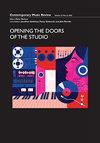The Polish School, Johann Sebastian Bach, and The Gospel According to St. John in an Avant-Garde Synergy: Music of Becoming (1965) by Serbian Composer Rajko Maksimović
IF 0.1
2区 艺术学
0 MUSIC
引用次数: 0
Abstract
In his orchestral composition, Musique de devenir [Music of Becoming, 1965], Serbian composer Rajko Maksimović (b. 1935) established a musical style he formed after hearing the works of Witold Lutosławski and other Polish composers at the first Music Biennale Zagreb (Yugoslavia, 1961). Maksimović believed that the novelties of the Polish school were much more interesting than (m)any of the achievements of the avant-garde Darmstadt circle or American experimental music. Thus, he structured Music of Becoming on clusters and applied aleatory principles to rhythm and pitch. As a support to this avant-garde ‘announcement’, Maksimović used selected lines from The Gospel According to St. John; just as the Gospel accounts for the genesis of the wor(l)d, Maksimović’s improvisation on Bach’s name (B–A–C–H) suggests the procreation of new music that is based on aleatoric principles and clusters.波兰学派,约翰·塞巴斯蒂安·巴赫和福音根据圣约翰在一个前卫的协同作用:音乐成为(1965年)由塞尔维亚作曲家拉杰科·马克西莫维奇
塞尔维亚作曲家Rajko Maksimović(生于1935年)在其管弦乐作品《成为的音乐》(Musique de devenir,1965年)中确立了他在第一届萨格勒布音乐双年展(南斯拉夫,1961年)上聆听了Witold Lutosławski和其他波兰作曲家的作品后形成的音乐风格。Maksimović认为波兰学派的新颖性比达姆施塔特先锋派或美国实验音乐的任何成就都有趣得多。因此,他将《成为的音乐》构建在集群上,并将语法原则应用于节奏和音高。为了支持这一前卫的“公告”,Maksimović使用了《圣约翰福音》中的精选台词;正如福音书解释了世界的起源一样,Maksimović对巴赫名字(B-A-C-H)的即兴创作表明了基于任意原则和簇的新音乐的诞生。
本文章由计算机程序翻译,如有差异,请以英文原文为准。
求助全文
约1分钟内获得全文
求助全文
来源期刊

Contemporary Music Review
MUSIC-
CiteScore
1.00
自引率
25.00%
发文量
48
期刊介绍:
Contemporary Music Review provides a forum for musicians and musicologists to discuss recent musical currents in both breadth and depth. The main concern of the journal is the critical study of music today in all its aspects—its techniques of performance and composition, texts and contexts, aesthetics, technologies, and relationships with other disciplines and currents of thought. The journal may also serve as a vehicle to communicate documentary materials, interviews, and other items of interest to contemporary music scholars. All articles are subjected to rigorous peer review before publication. Proposals for themed issues are welcomed.
 求助内容:
求助内容: 应助结果提醒方式:
应助结果提醒方式:


